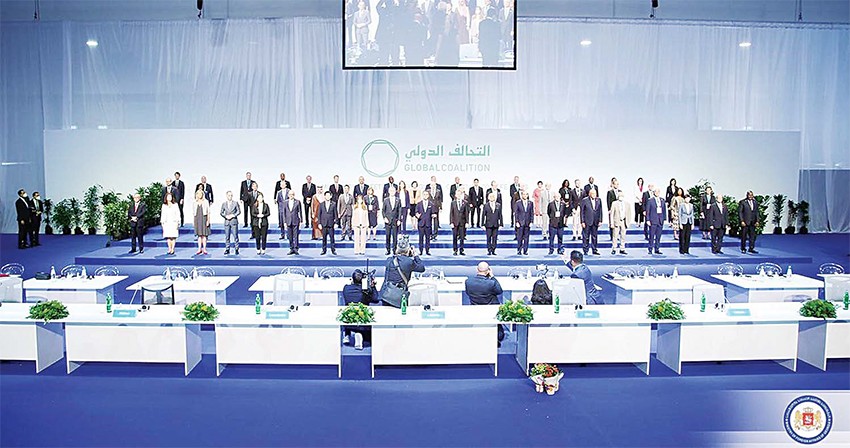29/06/2021
29/06/2021
ISIS still a global threat, says US
KUWAIT CITY, June 29, (Agencies): Kuwait’s Foreign Minister and Minister of State for Cabinet Affairs Sheikh Dr. Ahmad Nasser Al-Mohammad Al-Sabah headed on Monday Kuwait’s delegation participating in the ministerial meeting of the international coalition to defeat the so-called Islamic State (IS), held in the Italian capital Rome.

The meeting was held in response to an invitation from Italian Minister of Foreign Affairs and International Cooperation Luigi Di Maio and US Secretary of State Anthony Blinken to the allies to discuss efforts in the campaign to achieve the enduring defeat of IS. In his speech, Sheikh Dr. Ahmad Nasser said the international coalition meeting confirms to the whole world the unity and solidity of the globe’s position against terrorism and determination to defend humanity against the treacherous forces of terrorism, especially the IS (Daesh). He added that Kuwait cooperates with members of the international coalition for returning fighters to their countries with rehabilitation and reintegration into their societies in accordance with principles of international law and human rights. Kuwait renews its commitment to the international coalition against terrorism and adherence to activate the State of Kuwait guidelines, adopted in February 2018, which include preventing the financing of the group, disrupting its capabilities to carry out terrorist acts and exchanging information related to terrorism with the other stakeholders.
The guidelines also include transfer and return of terrorist fighters to their countries with rehabilitation and reintegration into their societies and supporting Iraq in the transition process from the phase of restoring stability to sustainable reconstruction. The meeting was inaugurated by Italian Foreign Minister Luigi Di Maio and his US counterpart Antony Blinken, who co-chaired the event. It is also attended by foreign ministers of the coalition’s member-countries, including Kuwait’s Foreign Minister Sheikh Dr Ahmad Al-Nasser Al-Sabah. Although the so-called Islamic State (IS) was defeated on a regional level, “we have yet to destroy its roots,” said Di Maio. He added that Italy’s military unit will remain in Iraq to help the country fight IS, while still respecting Iraq’s sovereignty. The Italian minister also noted that his country is looking forward to boost its efforts in the NATO mission, and is ready to take the mission’s leadership after Denmark. Di Maio suggested that the coalition would form a specialized group to fight IS in Africa in cooperation with African states. On his part, Blinken affirmed that cooperation and joint work since the establishment of the coalition in 2014 was key for defeating IS in Iraq and Syria. The meeting also discussed preventing the terrorist group from recovering after defeat and supporting stability in liberated areas in Iraq and Syria. The meeting is also attended by Secretary Generals of the Interpol, Arab League and the NATO, as well as other senior officials from the UN and the European Union (EU).
As the U.S. works on its military withdrawal from Afghanistan, members of the global coalition fighting the Islamic State group met Monday to chart future steps against the extremist group. The meeting came just a day after the U.S. launched airstrikes against Iran-backed militias near the Iraq-Syria border Amid significant other international priorities, including taming the coronavirus pandemic and stepping up the fight against climate change, the coalition is hoping to stabilize areas liberated from IS, repatriate and hold foreign fighters accountable for their actions and combat extremist messaging. Blinken and Di Maio urged representatives of the 77 other countries and five organizations that make up the coalition not to drop their guard. “We must step up the action taken by the coalition, increasing the areas in which we can operate,” said Di Maio. Outside of Iraq and Syria, he said there was an “alarming” surge in IS activity, particularly in the Sahel, Mozambique and the Horn of Africa. He called for the coalition to create a special mechanism to deal with the threat in Africa.
Blinken noted that despite their defeat, IS elements in Iraq and Syria “still aspire to conduct large-scale attacks.” “Together, we must stay as committed to our stabilization goals as we did to our military campaign that resulted in victory on the battlefield,” he said. Blinken announced a new U.S. contribution of $436 million to assist displaced people in Syria and surrounding countries and called for a new effort to repatriate - and rehabilitate or prosecute - some 10,000 IS fighters who remain imprisoned by the Syrian Defense Forces. “This situation is simply untenable,” Blinken said. “It just can’t persist indefinitely.” However, no countries present made any new commitment to repatriating their citizens and it was unclear if the number of detainees could be reduced in any significant way in the near-term. Blinken also announced sanctions against Ousmane Illiassou Djibo, a native of Niger, who is a key leader of the Islamic State affiliate in the greater Sahara. Djibo was designated a global terrorist, meaning that any of his U.S. are frozen and Americans are barred from any transactions with him.


